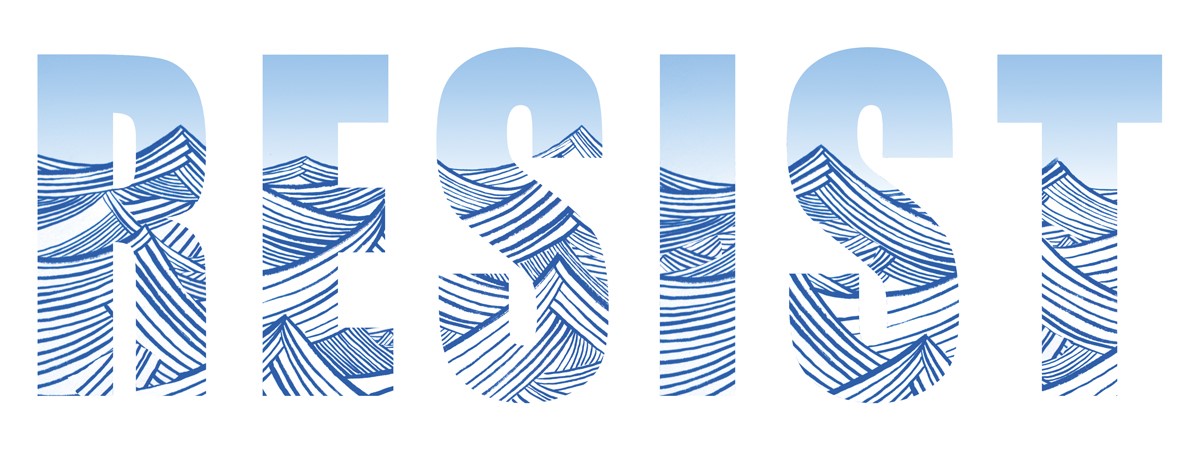
Artwork generously donated by 3 Fish Studios
2017 was a year of unprecedented challenge for our organizations. We faced an onslaught of anti-environment, pro-industry policy changes, cabinet appointments, and rhetoric from the Trump Administration on everything from climate change to citizen lawsuits to ocean and water protections. Our Russian Riverkeeper and Santa Barbara Channelkeeper also endured serious natural disasters – wildfire, mudslides, and flooding.
Despite these challenges, California Coastkeeper Alliance and California Waterkeepers stayed focused and worked together to achieve meaningful accomplishments. On a personal note, I was proud to be appointed by Senate President Pro Tem De Leon to serve on the California Coastal Commission.
All good lists seem to recognize the “top ten,” so here are ours:
- CCKA organized weekly “blue resistance” briefings, produced materials to inform and prioritize action to address federal legislative and administrative threats, and developed digital and other tools to infuse Waterkeeper issues into the broader movement defending clean water from the Trump Administration.
- CCKA conducted a study to assess voter attitudes toward citizen suits under the Clean Water Act. The polling found that Californians (76%) overwhelming support preserving this element of the Clean Water Act in state law, should it be rolled back at the federal level.
- Governor Brown signed into law a CCKA-sponsored bill (AB 574), which will make California the first in the nation to adopt drinkable recycled water standards, opening the door for community planning and investment in this drought-proof and cost-effective water supply source.
- CCKA catalyzed a new stormwater enforcement campaign to increase Water Board enforcement in order to hold permittees accountable for meeting water quality standards. In 2017, the Board developed a tool to focus enforcement on the most egregious polluters that are impacting impaired waters and disadvantaged communities. This is based on a tool developed by San Diego Coastkeeper and will be deployed as a pilot program in San Diego, Los Angeles, and the Central Valley in 2018.
- CCKA and Waterkeepers have long opposed insufficient monitoring requirements for agricultural polluters, which have, to date, failed to pinpoint those responsible for pollutant loading. This year, the State Water Board formally recognized that California’s current agricultural monitoring program is deficient in its precedent-setting East San Joaquin Agricultural Order and is convening an expert panel to develop recommended improvements.
- CCKA convened a retreat in Bolinas, bringing together roughly 60 agency partners, advocates, scientists, lawyers, educators, and Blue Business Council members from throughout the California Waterkeeper movement to develop new skills and strategies and celebrate the work of the people of our movement.
- The Once-Through Cooling Policy, adopted in 2010, requires power plants to mitigate their ongoing impacts to marine life through payments. CCKA advocacy prevented power plants in San Diego and Orange County from avoiding their mitigation payments, resulting in over $1 million in additional funding for local restoration and marine protected area implementation.
- CCKA launched the Clean Water Accountability Project to improve State and Regional Water Board function. As a first step, CCKA recruited a Blue Ribbon Panel of academics, former legislators, high-level agency staff, and other partners who began work to improve enforcement, reform the appointments process, and raise the profile and awareness of Water Board issues in the Governor’s race and among the public.
- Small cities and counties proposed a new regulatory scheme that would have removed transparency and accountability from legally-mandated water quality targets. CCKA successfully advocated for a permit that instead requires a demonstration that municipal stormwater management practices ensure that waters are safe to enjoy in places like Santa Barbara, Monterey, Healdsburg, and Humboldt.
- In 2015, CCKA worked to adopt the first statewide policy to control the flow of trash into waterways with the goal of no trash in California waters by 2030. This year, CCKA generated technical and legal guidance to build a bridge from the Trash Policy in law to actual local implementation that will achieve the desired result of no trash in California waters.

Executive Director Sara Aminzadeh leads CCKA’s initiatives to protect and defend California’s ocean, bays and rivers.



